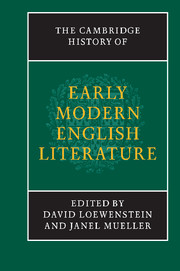Book contents
- Frontmatter
- Introduction
- 1 Modes and means of literary production, circulation and reception
- 1 Literacy, society and education
- 2 Manuscript transmission and circulation
- 3 Print, literary culture and the book trade
- 4 Literary patronage
- 5 Languages of early modern literature in Britain
- 6 Habits of reading and early modern literary culture
- 2 The Tudor era from the Reformation to Elizabeth I
- 3 The era of Elizabeth and James VI
- 4 The earlier Stuart era
- 5 The Civil War and Commonwealth era
- Chronological outline of historical events and texts in Britain, 1528–1674, with list of selected manuscripts
- Select bibliography (primary and secondary sources)
- Index
- References
5 - Languages of early modern literature in Britain
from 1 - Modes and means of literary production, circulation and reception
Published online by Cambridge University Press: 28 March 2008
- Frontmatter
- Introduction
- 1 Modes and means of literary production, circulation and reception
- 1 Literacy, society and education
- 2 Manuscript transmission and circulation
- 3 Print, literary culture and the book trade
- 4 Literary patronage
- 5 Languages of early modern literature in Britain
- 6 Habits of reading and early modern literary culture
- 2 The Tudor era from the Reformation to Elizabeth I
- 3 The era of Elizabeth and James VI
- 4 The earlier Stuart era
- 5 The Civil War and Commonwealth era
- Chronological outline of historical events and texts in Britain, 1528–1674, with list of selected manuscripts
- Select bibliography (primary and secondary sources)
- Index
- References
Summary
The questione della lingua: that is the question or, at least, the one that was posed by early modern Italians regarding the status of the vernacular in the sixteenth century. Renaissance Italian writers involved in the debate widely known as the ‘question of the language’ considered their options: they had to choose, first, between the native tongue and Latin, still the lingua franca of European culture; and second (if they chose Italian), they had to discriminate further among the several dialects of Italian then current. Early modern British authors, too, often faced such choices – whether to write in Latin or in the mother tongue and, if in the latter, what form of the vernacular to choose. Although the question of selecting among regional dialects had been more or less settled with regard to the written language, the British vernaculars were not yet standard languages; that is, they were neither uniform nor fixed by rule. The Renaissance in Britain has long been identified with a prodigious variety and plasticity in the forms and uses of native languages, a ‘linguistic exuberance’ characteristic of its greatest poets, including Edmund Spenser, William Shakespeare and John Milton. The Renaissance was no linguistic free-for-all, however: sixteenth- and early seventeenth-century writers, across a range of disciplines, address the question of the language by discriminating among available forms and experimenting with new ones. The linguistic choices made by Renaissance British writers, and what was at stake in the choosing, will be the subject of this chapter.
- Type
- Chapter
- Information
- The Cambridge History of Early Modern English Literature , pp. 141 - 169Publisher: Cambridge University PressPrint publication year: 2003
References
- 1
- Cited by



